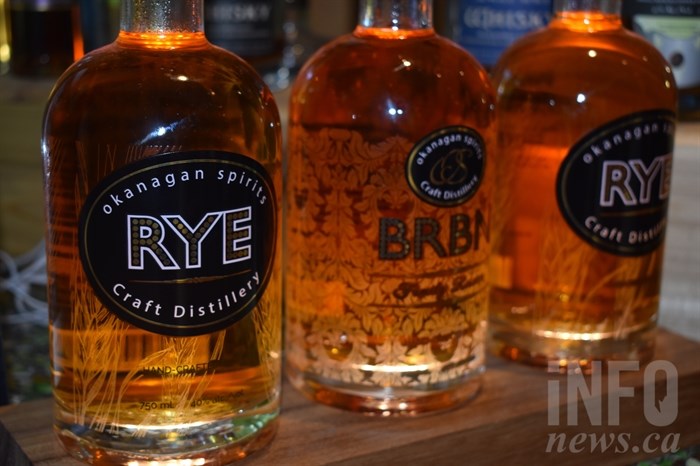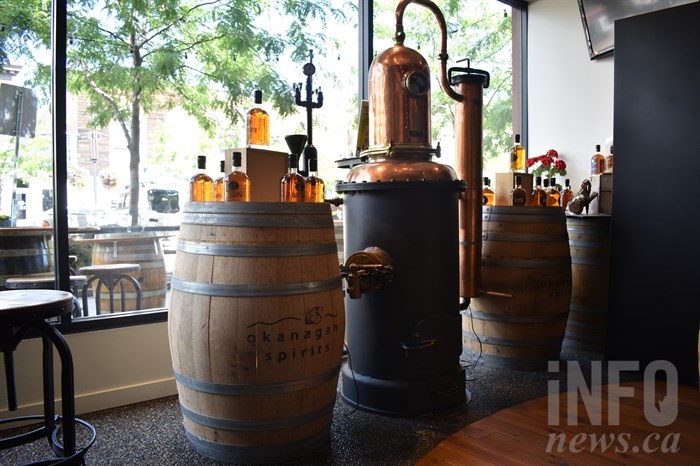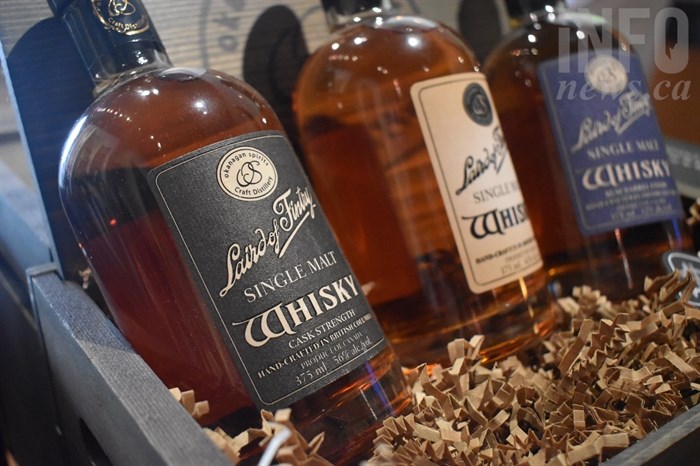
(BRIE WELTON / iNFOnews.ca)
August 26, 2019 - 11:00 AM
KELOWNA - Seventeen years ago, there was no such thing as a craft spirits distillery. In fact, there had been no such thing since prohibition.
In 2003, that all changed when the Dyck family decided to open Okanagan Spirits, right here in the Okanagan.
"When we came onto the scene with Okanagan Spirits, we looked at what had happened in the wine industry in the Okanagan,” recalls CEO of Okanagan Spirits Tyler Dyck. "Everyone was calling for more naturally made products that had a local story to tell.”
Up until then, spirits were exclusively mass-produced by large corporations which held a monopoly over the market. With mass-production comes a reduction in quality. The Dyck family wanted to return to lower-yield, higher-quality distilling traditions.
"It started on the idea of creating local, terroir specific alcohol,” Dyck explains. Before prohibition, he says this was common practice.
"Everyone used to make their own spirits… you were making your alcohol from what you could grow around you so it had a very distinct flavour of the land of that area."
Okanagan Spirits sources all their fruit locally, using products exclusively grown in B.C.
Although they succeeded in making authentic farm-to-flask spirits, for the first decade in operation, Okanagan Spirits was losing money hand over fist.
"The first ten years of our operational existence were kind of a financial nightmare,” Dyck said. "They were really hard, hard times.”
At the time, the only legislation that existed in B.C. was for commercial distilleries and not designed for small operations.
"For every dollar that we’d put into producing a bottle, we would lose another 2-3 dollars when that bottle sold,” he said. "We’d have to pay the government more than what it cost us to make the bottle.”
During that time, several other small distilleries opened their doors. Together, they formed the Craft Distillers Guild of British Columbia, of which Dyck is still president today.
"The goal of [the association] was to establish fairness in the alcohol industry,” said Dyck. "To get the government to make a craft distillers, or authentic distiller’s license that allowed you to produce from 100% local grains and treated you in a similar fashion to how they treat the wineries.”

Inside Okanagan Spirits on Bernard Avenue, Kelowna.
(BRIE WELTON / iNFOnews.ca)
When they began operation, Okanagan Spirits had been assured by the government that a new legislation for craft distilleries would be created soon. However, it was ten years before it was put into place.
"In 2013 we reached an agreement with the Liberal government,” Dyck said. “We established the first ever in North America, the first of its kind anywhere on the continent, craft distiller’s agreement.”
This represented a big step for craft distilleries, and allowed Okanagan Spirits to stay in business.
However, when it comes to the alcohol market in B.C., it’s far from an even playing field.
"They didn’t give us all the benefits they give the wineries,” explains Dyck, "They gave us about a quarter of those benefits.”
Under the current legislation, if Okanagan Spirits just sells the ferment they produce prior to the distilling process, they could release 1.5 million bottles of wine. The government would pay back 80 to 90 percent of the sticker price.
However, as soon as the alcohol goes through the still, the legislation changes. The production volume decreases to 1000 bottles, and the government would only pay back 20 percent of what they pay wineries.
For Dyck, and many others in the industry, this doesn’t make sense.
"It’s a system that dates back to prohibition that needs change,” he said.
In addition, craft distilleries are capped on how much they can produce, with heavy consequences if they sell more than they're permitted.

(BRIE WELTON / iNFOnews.ca)
"I’m only allowed to sell 50,000 litres until I start getting penalized,” he said. “If I go past 100 thousand litres, they’ll take my license away.”
Wineries, on the other hand, have no cap on how much they can sell. Nor are they required to pay as much taxes as a distiller. Dyck estimates that he pays 28 times more taxes than wineries. Including local mark-up and all taxes, he's charged 19 dollars per bottle.
Dyck points to job creation as another reason why craft distilleries deserve more government support.
Craft distilleries use four to ten times the amount of agricultural product that wineries do for the same volume of product.
“Four to ten times the amount of farmers benefit from it, four to ten times the amount of bottle makers in the province, bottle printers, shipper-receivers, trucking companies,” Dyck said. "Wll of those things benefit from supporting farm to flask spirits.”
For craft distillers in B.C., it’s a long road ahead, but it’s better than it was. In the past 16 years, the number of craft distilleries in B.C. has gone from zero to more than 60. The key is continuing to advocate for fairness.
"We continue to fight daily, it feels like hourly, with the government to try to get those other 75 per cent of benefits that they give to wineries,” Dyck said.
Despite the legal obstacles, this is an exciting time for craft distillers.
For the first time in more than 90 years, people have a chance to taste spirits, whether it’s whiskey, gin or vodka, or liqueurs or brandies, that have 100% local aspect to them,” Dyck said. “There’s [been] this renaissance of authentic craft production that hasn’t been seen since prohibition.”
B.C. distillers hope that the growing popularity of locally sourced spirits will spark change in government legislation.
To contact a reporter for this story, email Brie Welton or call (250) 801-9235 or email the editor. You can also submit photos, videos or news tips to the newsroom and be entered to win a monthly prize draw.
We welcome your comments and opinions on our stories but play nice. We won't censor or delete comments unless they contain off-topic statements or links, unnecessary vulgarity, false facts, spam or obviously fake profiles. If you have any concerns about what you see in comments, email the editor in the link above.
News from © iNFOnews, 2019